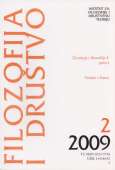Kantovo shvatanje prostora i zagonetka inkongruencije
Kant’s Consideration of Space and the Puzzle of Incongruence
Author(s): Una StojnićSubject(s): Philosophy
Published by: Institut za filozofiju i društvenu teoriju
Keywords: congruence; incongruence; incongruous counterparts; absolutism; relationism.
Summary/Abstract: In this paper we are dealing with Kant’s view on the phenomenon of incongruous counterparts, in particular with the argument from his article “On the First Ground of the Distinction of Regions in Space”, where the phenomenon of incongruous counterparts is used as an argument for the existence of the absolute and objective space, and with the argument from Kant’s Inaugural Dissertation in which he uses the phenomenon of incongruous counterparts again, but this time for a different purpose – as an argument in favor of the idea of space as a pure intuition. Our aim is to show that Kant’s argument from “On the First Ground of the Distinction of Regions in Space”, although it shows the inadequacy of Leibniz’s definition of congruence, does not in fact represent the reductio ad absurdum of the relationist view, for his argument in favor of the existence of the absolute space represents merely the inference to the best explanation. We also propound an alternative account of the phenomenon of incongruous counterparts, which is in line with the relationist theory. Furthermore, we call in question Kant’s argument from the Inaugural Dissertation, according to which incongruence could not be explained discursively, and we put forward a conceptual determination of the incongruence in terms of the notions of similarity, equality and congruence, taken as the possibility of objects to be included within the same spatial boundaries. / U ovom radu bavimo se Kantovim shvatanjem fenomena inkongruentnih pandana, pre svega njegovim argumentom iz spisa „O osnovnim principima razlikovanja smerova u prostoru”, gde Kant fenomen inkongruentnih pandana koristi kao argument u prilog tvrdnje o postojanju apsolutnog i objektivnog prostora, kao i argumentom iz Kantove Inauguralne disertacije, u kojoj se on ponovo poziva na fenomen inkongruentnih pandana, ali ovoga puta sa drugačijim ciljem – kao argument u prilog shvatanja prostora kao čistog opažaja. Cilj nam je da pokažemo kako Kantov argument iz spisa „O osnovnim principima razlikovanja smerova u prostoru”, iako pokazuje neadekvatnost Lajbnicove definicije kongruencije, ipak ne predstavlja reductio ad absurdum relacionističke pozicije, budući da njegov argument u prilog postojanja apsolutnog prostora predstavlja samo zaključak na najbolje moguće objašnjenje, kao i da ponudimo alternativno objašnjenje fenomena inkongruentnih pandana, koje je u skladu sa relacionističkom teorijom. Takođe, dovodimo u pitanje Kantov argument iz Inauguralne disertacije, prema kojem se inkongruencija ne može izraziti diskurzivno, nudeći pri tome pojmovno određenje inkongruencije preko pojmova sličnosti, jednakosti i kongruencije, shvaćene kao sposobnost objekata da zauzmu istovetne prostorne granice.
Journal: Filozofija i društvo
- Issue Year: 20/2009
- Issue No: 2
- Page Range: 261-277
- Page Count: 17
- Language: Serbian

